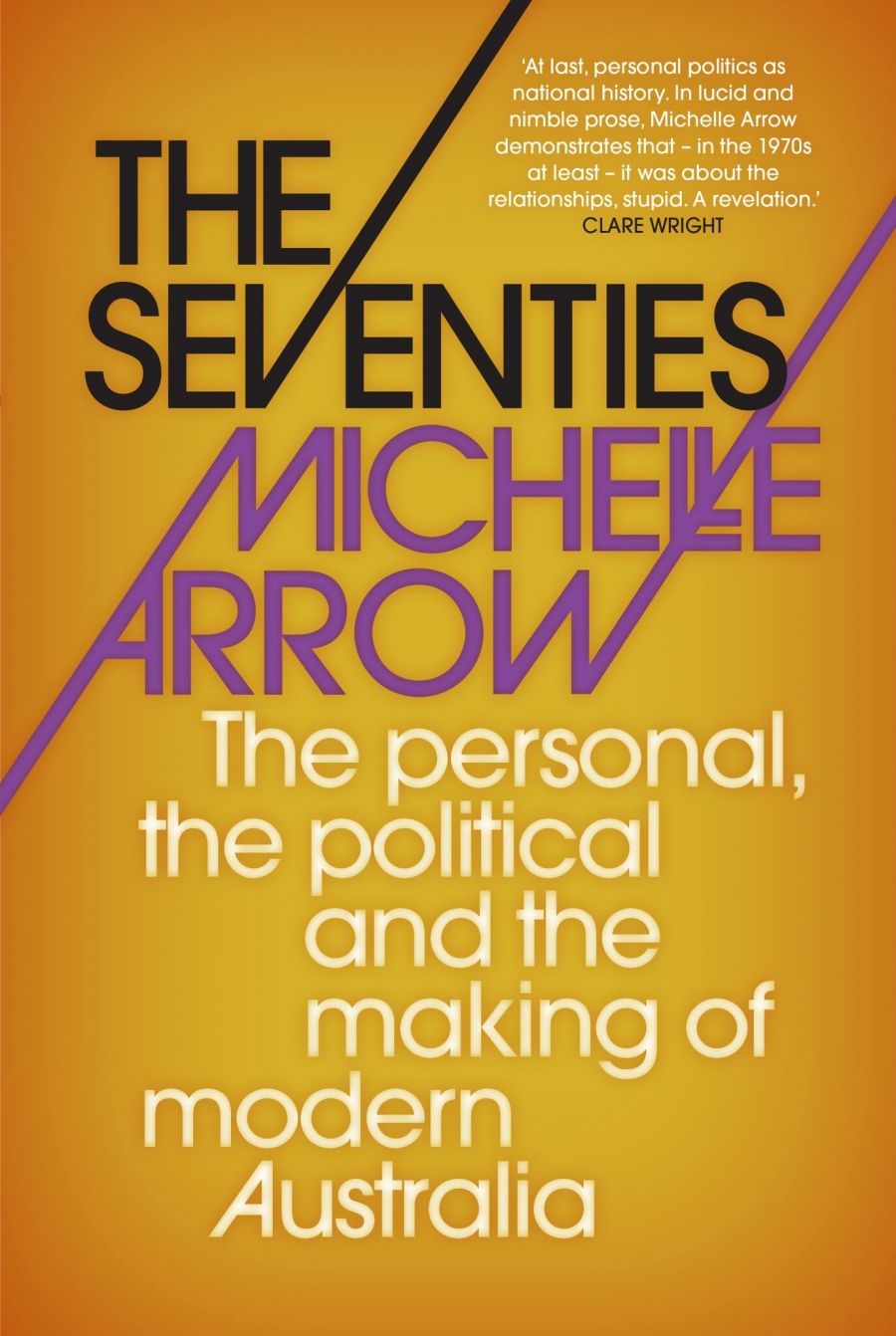
- Free Article: No
- Contents Category: Australian History
- Custom Article Title: Zora Simic reviews <em>The Seventies: The personal, the political and the making of modern Australia</em> by Michelle Arrow
- Custom Highlight Text:
The first volume in this series, Beverley Kingston’s A History of New South Wales, was published in 2006. Since then another five have appeared, including a book on Tasmania by Henry Reynolds and another on Victoria by Geoffrey Blainey. Cambridge University Press may be proceeding with its ...
- Book 1 Title: The Seventies
- Book 1 Subtitle: The personal, the political and the making of modern Australia
- Book 1 Biblio: Cambridge University Press, 39.95 pb, 319 pp, 9781107623651
 Liz Goldring at the ‘Women's Embassy’ on the lawn outside Parliament House, Canberra, 2 May 1973. Goldring and her fellow activists were protesting women’s absence from the parliament during a debate on abortion law reform (The Canberra Times, image supplied by the ACT Heritage Library)
Liz Goldring at the ‘Women's Embassy’ on the lawn outside Parliament House, Canberra, 2 May 1973. Goldring and her fellow activists were protesting women’s absence from the parliament during a debate on abortion law reform (The Canberra Times, image supplied by the ACT Heritage Library)
For Arrow, the Commission’s archive is a ‘precious historical resource’, and she should know. She is the first historian to have proper access to it. In 2014, with Catherine Freyne and Timothy Nicastri, Arrow won the NSW Premier’s Multimedia History Prize for the radio documentary Public Intimacies: The Royal Commission on human relationships (2013). Evidently, the Royal Commission also inspired the larger history of the 1970s, a decade only tackled by one historian previously, and clearly ripe for fresh narration and examination. Arrow – a seasoned social and cultural historian, whose previous books include the entertaining history Friday on Our Minds: Popular culture in Australia since 1945 (2009) – plays to her strengths in The Seventies. She offers not a definitive or exhaustive history of the decade, but one ‘primarily concerned with the ways new understandings of gender and sexuality transformed Australia’. Accordingly, she focuses on the women and gay and lesbian movements, but in a far more generative and wide-ranging way than that ostensibly narrow window might at first imply. While providing necessary information about the origins and development of both social movements, Arrow is less concerned with the intra-politics between each movement than she is in tracing the public impact of each more broadly, including via some of their most high-profile spokespeople. They include Elizabeth Reid, the first women’s affairs adviser to a head of state in the world, given due recognition in a nuanced chapter on International Women’s Year (1975), and Dennis Altman, who was one of several gay activists to stand up and successfully demand gay men and women be included in the terms of reference for the Royal Commission.
The pleasing effect of Arrow’s approach is that rather than marginalising feminist and gay activism, she gives it due recognition as influential, whether directly or in a more diffuse fashion, and evolving. Specialists of feminist and gay and lesbian history can rest assured that Arrow knows the key events, debates, and players (I was pleased to see Aboriginal activist Pat Eatock get a starring role), but to the general reader to whom this book is also or especially pitched The Seventies makes a strong case that ‘public intimacies’ were a defining and fascinating feature of a decade of Australian history that also includes the Dismissal – an exhausted episode that hardly needs more historical attention, though Arrow dutifully covers it, and in an interesting way too.
Throughout The Seventies, Arrow draws rich detail from new knowledge generated about the personal lives of Australian men and women, and their shifting expectations of political responses to these. Some of this revealing material directly emerged from new social movements (such as the Women’s Electoral Lobby’s ground-breaking 1972 survey of women voters), while others came from government, including a 1975 survey initiated by Reid, which exposed ambivalence and unease about women’s liberation. Arrow also mines popular culture for further evidence of the new public visibility of personal politics, offering illuminating discussion of new genres and formats for speaking out, including the ABC series Chequerboard and talkback radio. From this broad range of examples, some stand out because they articulate enduringly common problems – such as access to affordable childcare – which successive governments have failed to properly address. Other examples leap from the page because they remind us that the 1970s was another time. For instance, a man who shared his fatherhood experiences with the Royal Commission noted that he was the first father at Parramatta District Hospital to be present at the birth of his child.
Arrow’s history concludes in the early 1980s, with the election of a Labor government and the Women Against Rape protests, which quite possibly, if inadvertently, contributed to the ongoing revival of Anzac Day. At this point, Arrow’s occasional and careful reflections throughout her history of the proximity or distance of the 1970s to our own era come to the fore. The Royal Commission into Human Relationships uncovered new and distressing evidence about the prevalence of child abuse and neglect, including sexual abuse, but, as Arrow notes, at that time, ‘few were prepared to discuss it’. The more recent Royal Commission into Institutional Responses to Child Abuse represents a significant advance, yet the family and home – the most common sites of abuse, Arrow reminds us – were outside its scope. As issues associated with our private lives continue to be debated and legislated (including in parliaments that remain dominated by men), Arrow’s thoughtful and accessible history will no doubt be a valuable resource for anyone interested in understanding how we got here and how far we still have to go.


Comments powered by CComment